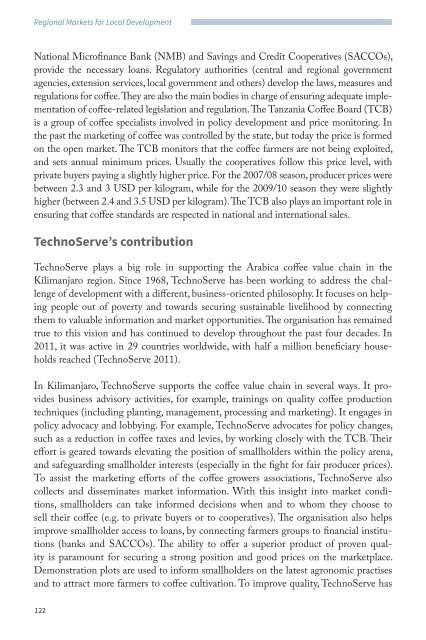Regional Markets
56ec00c44c641_local-markets-book_complete_LR
56ec00c44c641_local-markets-book_complete_LR
Create successful ePaper yourself
Turn your PDF publications into a flip-book with our unique Google optimized e-Paper software.
<strong>Regional</strong> <strong>Markets</strong> for Local Development<br />
National Microfinance Bank (NMB) and Savings and Credit Cooperatives (SACCOs),<br />
provide the necessary loans. Regulatory authorities (central and regional government<br />
agencies, extension services, local government and others) develop the laws, measures and<br />
regulations for coffee. They are also the main bodies in charge of ensuring adequate implementation<br />
of coffee-related legislation and regulation. The Tanzania Coffee Board (TCB)<br />
is a group of coffee specialists involved in policy development and price monitoring. In<br />
the past the marketing of coffee was controlled by the state, but today the price is formed<br />
on the open market. The TCB monitors that the coffee farmers are not being exploited,<br />
and sets annual minimum prices. Usually the cooperatives follow this price level, with<br />
private buyers paying a slightly higher price. For the 2007/08 season, producer prices were<br />
between 2.3 and 3 USD per kilogram, while for the 2009/10 season they were slightly<br />
higher (between 2.4 and 3.5 USD per kilogram). The TCB also plays an important role in<br />
ensuring that coffee standards are respected in national and international sales.<br />
TechnoServe’s contribution<br />
TechnoServe plays a big role in supporting the Arabica coffee value chain in the<br />
Kilimanjaro region. Since 1968, TechnoServe has been working to address the challenge<br />
of development with a different, business-oriented philosophy. It focuses on helping<br />
people out of poverty and towards securing sustainable livelihood by connecting<br />
them to valuable information and market opportunities. The organisation has remained<br />
true to this vision and has continued to develop throughout the past four decades. In<br />
2011, it was active in 29 countries worldwide, with half a million beneficiary households<br />
reached (TechnoServe 2011).<br />
In Kilimanjaro, TechnoServe supports the coffee value chain in several ways. It provides<br />
business advisory activities, for example, trainings on quality coffee production<br />
techniques (including planting, management, processing and marketing). It engages in<br />
policy advocacy and lobbying. For example, TechnoServe advocates for policy changes,<br />
such as a reduction in coffee taxes and levies, by working closely with the TCB. Their<br />
effort is geared towards elevating the position of smallholders within the policy arena,<br />
and safeguarding smallholder interests (especially in the fight for fair producer prices).<br />
To assist the marketing efforts of the coffee growers associations, TechnoServe also<br />
collects and disseminates market information. With this insight into market conditions,<br />
smallholders can take informed decisions when and to whom they choose to<br />
sell their coffee (e.g. to private buyers or to cooperatives). The organisation also helps<br />
improve smallholder access to loans, by connecting farmers groups to financial institutions<br />
(banks and SACCOs). The ability to offer a superior product of proven quality<br />
is paramount for securing a strong position and good prices on the marketplace.<br />
Demonstration plots are used to inform smallholders on the latest agronomic practises<br />
and to attract more farmers to coffee cultivation. To improve quality, TechnoServe has<br />
122


